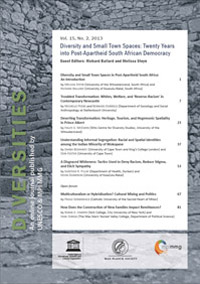A Disgraced Whiteness: Tactics Used to Deny Racism, Reduce Stigma, and Elicit Sympathy
by Suntosh R. Pillay (Department of Health, Durban) and
Kevin Durrheim (University of KwaZulu-Natal)
To cite this article: Pillay, S. R., & Durrheim, K. (2013). A Disgraced Whiteness: Tactics Used to Deny Racism, Reduce Stigma, and Elicit Sympathy. Diversities, 15(2), 53–65. https://doi.org/10.58002/xj8x-k260
The stigma of being white in post-apartheid South Africa is a complex challenge. In 2008 the town of Swartruggens was discredited in the media following a shooting of black shack dwellers by a white Afrikaans boy, igniting racial tensions and creating a media narrative of ‘victimised blacks’ and ‘violent whites’. This paper discusses part of a broader study investigating social relations in the town almost a year after the shooting. This paper focuses on qualitative, open-ended interviews with white residents of the town, arguing that managing a stigmatised white identity involves producing a positive construction of one’s place of residence, since identity and place are interwoven. The discursive production of place-identity in dialogue and interaction tries to accomplish the tasks of reducing stigma, denying racism, and even eliciting sympathy. This paper also calls for a foregrounding of geographical location in work on identity construction.
Keywords: discursive psychology, discourse analysis, place-identity, post-apartheid, racism, race-relations, sympathy, Swartruggens, Skierlik, stigma, white identity
|
